Peter Farrelly Returns To ‘Green Book’s Toronto Awards Launch Pad For ‘The Greatest Beer Run Ever’ With Zac Efron, Bill Murray & Russell Crowe: Q&A
- Oops!Something went wrong.Please try again later.
- Oops!Something went wrong.Please try again later.
- Oops!Something went wrong.Please try again later.
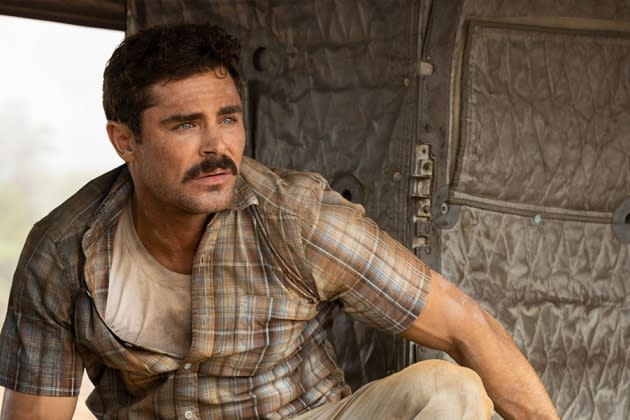
EXCLUSIVE: For the first time since launching eventual Best Picture Oscar winner Green Book five years ago, writer-director Peter Farrelly returns to the Toronto Film Festival with another drama built around an obscure and difficult to be believed but fact-based road trip set in the turbulent 1960s.
The Greatest Beer Run Ever is the story of Chickie Donohue (Zac Efron), a patriotic longshoreman from New York who in the late ’60s is a gung ho supporter of the Vietnam War effort, and who essentially embraces a suggestion by the bartender at their local watering hole (an unrecognizable Bill Murray) to travel by boat to the jungles of ‘Nam to track down soldiers from the neighborhood and bring them cans of beer and show the boys they haven’t been forgotten back home. This harebrained tour becomes a wakeup call to Donohue about the terrifying things that are really going on over there. Russell Crowe plays a war correspondent who helps Donohue, and exposes hard truths about the lies the U.S. government are feeding to the American public about a fruitless war that is quickly spinning out of control and putting young men through the grinder.
More from Deadline
Peter Farrelly In Talks With Zac Efron, John Cena For R-Rated Comedy 'Ricky Stanicky'
Toronto Review: Stephen Frears' 'The Lost King' Starring Sally Hawkins
While Green Book was a crowd-pleasing hit globally ($321 million worldwide on a $23 million budget) that won Best Picture, Best Original Screenplay and Best Supporting Actor for Mahershala Ali, its release at a particularly heightened moment of sensitivity made it an unexpected ordeal for all involved. This began the moment after it scored an upset win at the Golden Globes and emerged as a Best Picture threat. Old missteps were curiously unearthed and blasted by press and on social media. There were charges the story was inaccurate, from some members of the family of Ali’s character. It all seemed like a page out of Harvey Weinstein’s old Oscar whisper campaign playbook (which Weinstein always denied). When Deadline smelled a rat and published audio conversations from Tony Lip and Doc Shirley that corroborated all of the disputed scenes using the voice of the only two men (both dead by then) who were in the car on that ride, no press picked up that story. Were they reflecting bitterness that a white man directed a film about racism in the Deep South? Was the mistake not involving Shirley’s relatives? Farrelly has had time to ponder a painful period, and here he shares some of this along with his excitement for a follow-up film that is his first project made for a streamer. Apple Studios financed and releases the film later this month after Beer Run has its World Premiere at TIFF on Tuesday. Farrelly took a break from prepping a series adaptation of the Richard Russo novel Straight Man with Better Call Saul‘s Bob Odenkirk, to discuss.
DEADLINE: Why go on this beer run to Vietnam as the follow-up to winning two Oscars for Green Book?
PETER FARRELLY: Well, I got interested in this before we ever started winning awards for the other one. We made that movie, and it was fun for a while. We thought we made something really good, we liked it, and we didn’t see that we were going to get caught in culture wars and all that sh*t.
Somewhere along the line somebody had sent me this short docu by Andrew Muscato, about how Chickie Donohue goes to Vietnam. This was five years ago. I call my sister Cindy, who’s also my attorney. Who has the rights to this story. It was Skydance and I talked with David Ellison, Don Granger and Dana Goldberg, and we just started developing it. I know people will ask, Green Book was about real persons, did I really want to make another one of these? It’s just one of those things. I don’t know where my stuff comes from. Somebody sent me this thing, it’s in my lap and that’s it. I’ve never been a planner, my next movie should be about this or that. No. It is odd this is another one about a real person that takes place in the ’60s oddly, but it wasn’t planned that way. It’s coincidence.
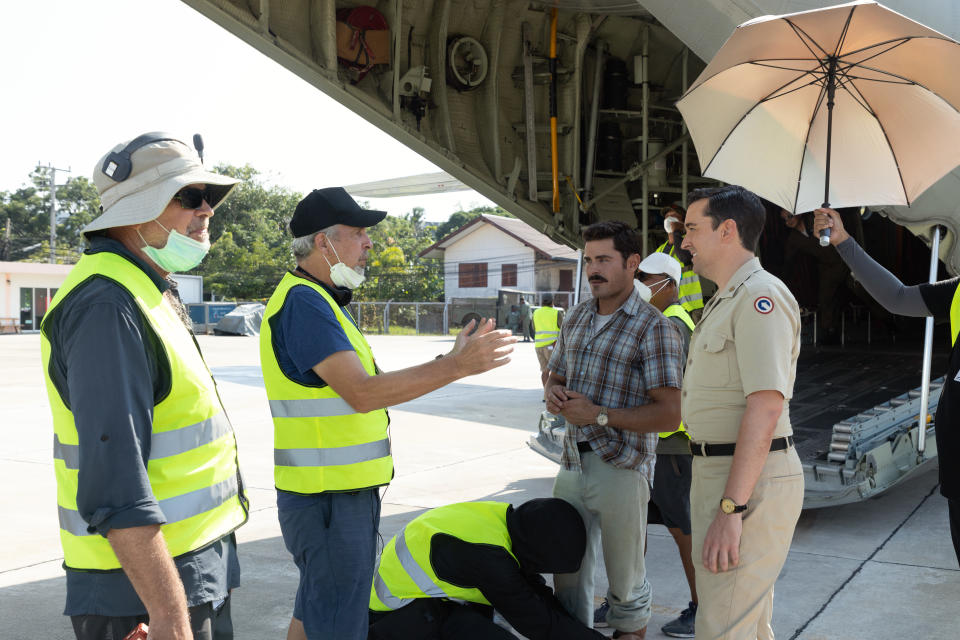
Courtesy of Apple
DEADLINE: Green Book was a trip through the Jim Crow South in ’62, and this was a moment when the country began being polarized by skepticism over deaths in Vietnam and skepticism over the Pentagon’s message we were winning?
FARRELLY: In ’67 and ’68. I was 10 and I remember the war coming into our living room every day on the news and just watching it. Summers when we always went to Cape Cod, I remember the jets going from Otis Air Force Base overhead, nonstop, and this sense we were at war. I remember everybody around was in favor of the war in 1967. When Cassius Clay, Muhammad Ali didn’t go into the Army, everyone thought he was a coward and when fought Joe Frazier, we were all rooting for Frasier to beat the coward. It wasn’t until several years later in the ’70s when I was a teenager that you started realizing what a hero Ali was and how brave it was to him to follow his conscience and do what was right. And the truth was, if he had gone into the military, they were just going to take him around to bases and show him off, but he didn’t believe in that war and had the integrity and courage to stand up against it. That’s Chickie Donohue’s story start. He thinks it’s a good war like most of the country at the time and along the way on this journey finds out that it wasn’t such a good war.
DEADLINE: It’s interesting because until well into the film, you are thinking, is this guy the biggest idiot in the world to head into a war armed with cans of beer? Then it turns very serious, when he finds his neighborhood pals and gets a taste of the chaos and terror they were experiencing. Talk about the structure you used?
FARRELLY: Well, it happened organically, we didn’t have to tweak much. It did happen that when he got off the boat in Vietnam, his first friend Collins was literally 200 yards away from him on another boat, just a crazy coincidence. Just like when he ran into the guy in the middle of the jungle. Those things just happened. I wished it hadn’t happened that way because it seems too convenient a coincidence and you are like, what’s f*cking going on? But it happened, so we went with it. It starts to turn when he gets to Dugan and Dugan’s reaction was not what he expected. Collins, the first one he found, was happy to see him, and they drank all night. They had a ball. But Collins did try to talk him out of going on. He said don’t do this. This is funny. Great. We had laughs but don’t go further with this, you can’t do it. But Chickie kept going. When he got to Dugan the reaction he got was not what he expected.
Dugan was up in LZ Jane where there had been a lot of action near the border, and he’s seen friends die. To this day, Dugan can’t watch the movie. It triggers him. He saw Chickie and the first thing he thought is, uh oh, what the hell happened at home that this guy is coming here? Is it my whole family? Why is he here? When he realized he just came to bring beer, he was furious because he had to run across the thing to get to him, A, but B, he didn’t have time for this. He’s trying to stay alive, and he doesn’t need to babysit this moron walking around, bringing people beer. That was the turning point logically for the story and in our movie. It turns there and you start seeing real stuff.
People got killed in that little battle he was in, but not in his foxhole. Killed around him, and he killed some people on the other side, but that wasn’t important to us. It wasn’t about showing guys get hit. It was showing the fear, the life, what you’re doing, how tense it is and how pointless it was. They’re shooting at us. We’re shooting at them. We have no idea what the hell is going on. We don’t know why we’re doing it. That’s when things start to turn.
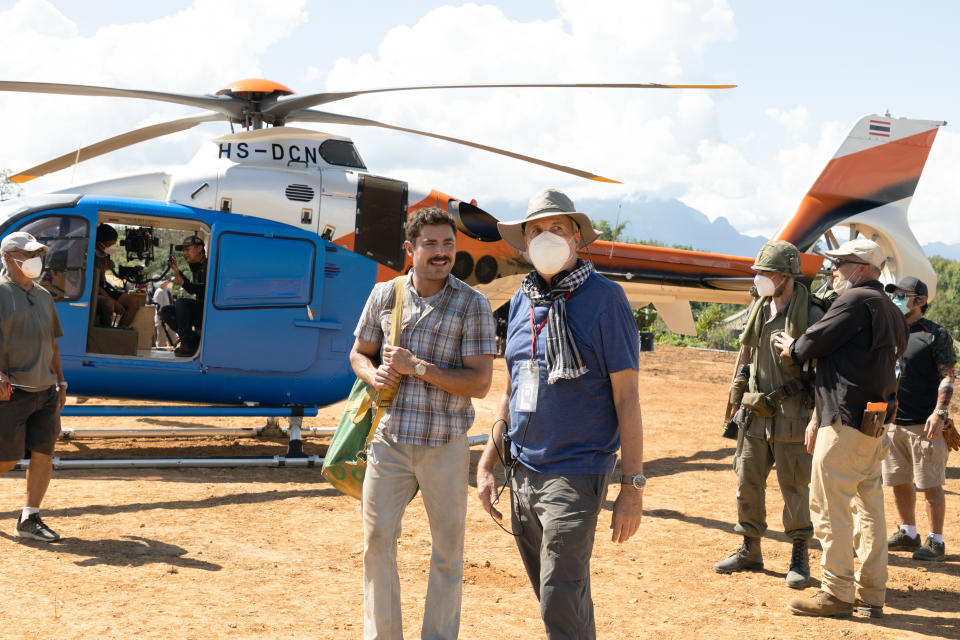
Courtesy of Apple
DEADLINE: There is also the involvement of the CIA, which makes Chickie’s plight harder because of the things he sees…
FARRELLY: The one thing that I will tell you that’s in the movie but not in the book by JT Molloy is the scene with the helicopter. The reason we put that in is because in researching this, we kept coming across the Phoenix Program, a CIA program that was not known to Americans until like the ’90s when the Freedom of Information Act brought it to light. What we found out is that our country quote unquote disappeared 25 thousand to 75 thousand civilians they thought were working with the North Vietnamese. Because Chickie got mistaken for a CIA agent along the way we wove this thing in just because I wanted people to realize what was happening out there.
And that was part of the horror of Vietnam. What we’re trying to say most of all in this story is that it is a horrible war, but it wasn’t the soldiers’ fault. The soldiers were the exact same guys as the guys who went to World War II. They thought they were patriots and they thought they were saving the world. But they weren’t. It was really bad leadership. That’s the message of the movie. I hope that when a Vietnam vet walks out of this movie, he feels like, yeah that’s accurate. And when an antiwar protestor from that time walks out of the movie he or she feels the same thing. I wanted to tell the truth from both sides.
DEADLINE: Zac Efron is playing against type. He’s so jacked, he looks like he ought to be running around with a gun, and a knife between his teeth. What made him right for Chickie?
FARRELLY: Because when I sat down with Zac, he had this openness, and he wanted to try something different. He said, I’m ready to do something else, try something where people won’t recognize me. I loved how earnest he was about trying something different. And he was the most open actor I’ve ever worked with. Most actors, you walk up between takes, give your notes, and you can feel while you’re talking to them that they’re not listening, because they’re in their own heads thinking what they should do. They’re not listening. I’d go to Zac and he’s looking at me. Come on, tell me. What do I do? I haven’t seen anybody like that since Cameron Diaz in There’s Something About Mary, where she was just like come on push me in this direction or that direction. It’s exciting to work with somebody like that.
Zac in character reminded me of a young Saturday Night Fever Travolta. He’s good-looking. He’s a flawed character. He’s not that bright but his heart is in the right place and he’s always trying to improve himself and become a better person. Despite his flaws, he always is looking to become better. It is easier to root for a guy like that. I was just so impressed with his performance. I think he deserves everything. I hope he gets a lot of credit for this movie because he’s in every scene and he nailed it.
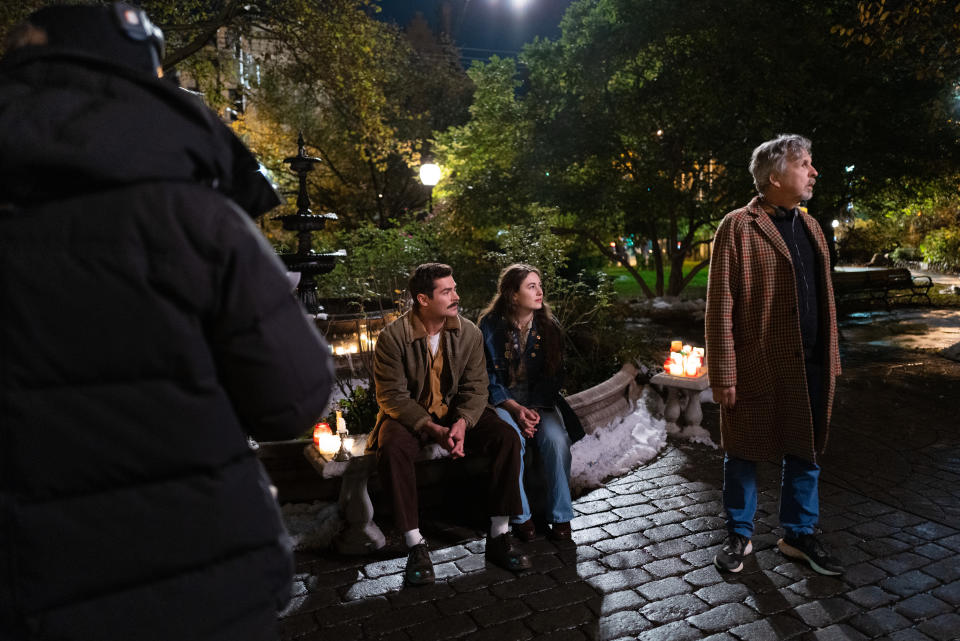
Courtesy of Apple
DEADLINE: You always hear how hard it is to get a commitment from Bill Murray, though you and your brother Bobby made Kingpin with him. How did you get him and why then would you make him barely recognizable?
FARRELLY: That was Bill’s idea, putting the brush cut on him. When he put that hairpiece on, he’d walk outside where we were shooting in Jersey City and Patterson, New Jersey. There were crowds of people in the street, and nobody recognized him. I don’t know why. I understood why no one recognized Clark Kent with the glasses.
I’m close with Bill, it’s my fifth thing with him. So, I know how to reach him. I know this; if I call his 800 number, he’s going to call me back…within a month. That’s reassuring. Bill and Russell Crowe were extremely important to this movie because both of them worked with the young actors, and they were helpful. In those bar scenes, Bill was as much of a director as I was. He was helping the actors. He asked me, he said hey, you mind if I work with the actors. I said, Are you kidding? Please. He was giving them tips, saying, you’re telegraphing this. Don’t do this. Try this. Bill is the best. He was making everybody’s performance a little better and Russell was that way with Zac.
DEADLINE: How?
FARRELLY: Russell was so patient because Zac had five pages to memorize, and it’s hard to be prepared every single day. What Russell would do is he’d take Zac aside and talk to him. Try this. Try this. Do that. Don’t worry about it. Zac was in awe of Russell, because he’s Russell Crowe. If Russell would have had any kind of attitude, it would have made it really hard on Zac, but he did quite the opposite. He’d go, okay Zac, this is what we’re going to do. Like Bill did, Russell asked me, do you mind if I work a little with Zac. I said please do. I love that. When I make a movie, it’s a team effort. If the hair person came over and said I have some ideas, can I talk to Zac? I’d say, yeah go talk to him. I’m all for everybody with any ideas. Ultimately, I’m going to see what they’re doing and if it’s not good I’m going to push back. But when you have Bill Murray and Russell Crowe giving tips to the actors it’s very, very helpful.
DEADLINE: The other thing about Russell is, as soon as his war correspondent character opened his mouth, the movie changed. It became…not some frivolous road trip. The gravitas he brings in this stage of his career…
FARRELLY: That was our goal is to have somebody…Russell is an amalgamation of many correspondents that Chickie met over there, and we just took all their stuff and put it into one person. Much the way in Catch Me If You Can, the way Spielberg did with Tom Hanks’ character. That was based on several federal agents and officers. We needed somebody with the gravitas and authority of a Peter Arnett or the Vietnam War correspondent Tim Page. We called both those guys for advice and opinions on certain things and they were extremely helpful.
DEADLINE: You explained what you hope people who watch the movie get out of it. But theatrical will be limited and most will see it on Apple TV+. Green Book, your comedy hits There’s Something About Mary, Kingpin and Dumb and Dumber, were all theatrical. How do you feel about this shift?
FARRELLY: It does open in theatres, thank God. I like that. I’m not going to complain about it because that’s Apple’s business model, and I signed up for it and I knew what I was getting. It was hard to get this movie made, and it doesn’t happen without Apple. They loved it and supported me 100 percent and gave me everything I needed. Here’s the thing. Dumb and Dumber, 90 percent of the people saw it on their TVs even though it was a huge hit. They’re still watching it, years and years and years later, and it works. So, I don’t have a problem with it.
DEADLINE: I remember seeing you Oscar night holding two trophies and looking like you went through 15 rounds with Joe Frazier. Were these controversies surrounding Green Book the result of a concerted attempt to take down the movie, by a rival?
FARRELLY: I think part of it was, but not all of it. But definitely part of it. Other people wanted to win, or I should say other studios wanted to win the awards, and that was part of it. But it was also a specific time and we got caught in the culture wars. Things are changing and for the better in race relations. And this was about race, and we caught some crossfire but I’m okay with it. I’ll take a couple lumps because the way things are going now, are the way they should be going. They’re going forward in a better way and if I take a few hits along the way I’m fine with it, but it wasn’t a very happy time.
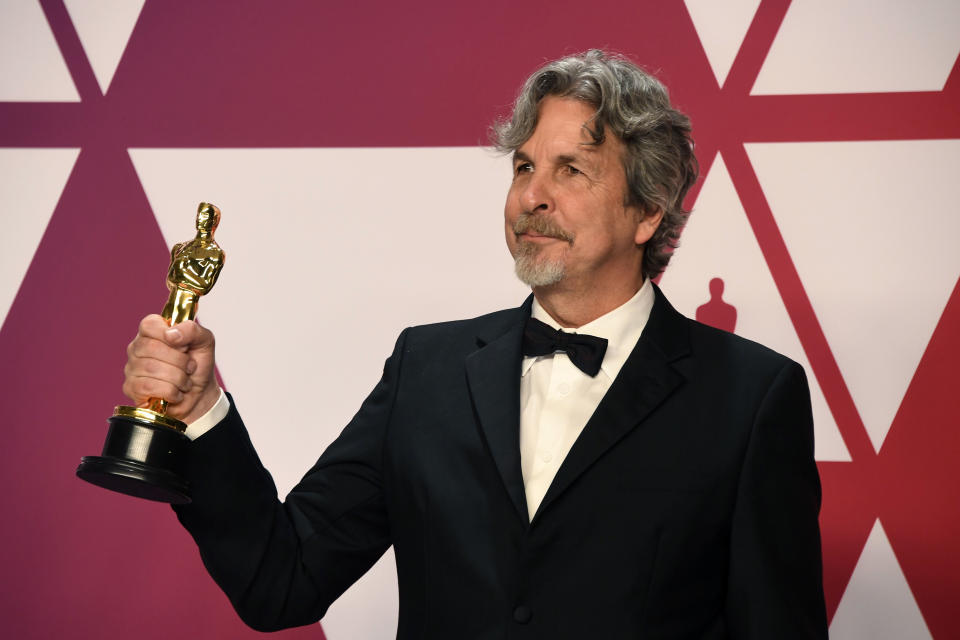
Frazer Harrison/Getty Images)
DEADLINE: You occupied a different space, comedy, than what the Academy prizes.
FARRELLY: When somebody wins a golf tournament or the Super Bowl…the Oscars is our Super Bowl for us and I see the joy that everybody gets to experience from all sides. Nobody is coming at them the next day saying sh*t they shouldn’t have won. Everybody is saying they won! That’s what hurt. Winning and then not be able to read the papers about it because there was so much negativity. But something good always comes out of it. I learned a lot about my wife, who kept me held up for those six months of battle. She was my rock, and she never had to be before. I don’t know if I would’ve gotten through that without my wife Melinda because she helped me keep it in perspective. She said, Pete, this movie is a good thing for the world, and it was true. But it wasn’t my happiest time, and I haven’t seen the Oscar since the day I got him. I put him in the closet and it’s still there.
DEADLINE: Why?
FARRELLY: To be honest, it’s not my identity. I don’t identify with it. It’s not like I always wanted an Oscar and I got it and I’m going to put that in the middle of the living room. I’m grateful as hell to have gotten it but I never expected, it’s not my identity and also I didn’t want it to be my kids’ identity. I didn’t want my kids to walk in every day and see a couple Oscars, a couple Golden Globes. I just think it’s…not healthy. I think I want them to aspire to something greater.
DEADLINE: You read stories like Tom Hanks saying that if his Oscar-winning role in Philadelphia came along, he would not play it and that a gay actor should. I know some groused that Green Book fit a “white savior” trope, but I found it an uplifting story about two guys who helped each other. I can’t help but wonder if there would have been a peep had it been made by a Black director. If you were putting together Green Book now, would you still direct it or would you look for a Black filmmaker?
FARRELLY: No. I’d absolutely direct it because it was told from the point of view of the white driver, by his son who’d gotten all the information from his father. I don’t think anybody could tell it better than us, to be honest. This is what I remind people. It’s not like it was a competition for the story and who was going to make it. Like when a studio has this idea and then they’re taking in a bunch of writers and directors and figuring it out, which happens a lot. Well, this wasn’t that. This was an idea that I got from Nick Vallelonga, and I said, this is a great story. We had to scrape and flight and claw to get the movie made. It wouldn’t have gotten made if we hadn’t fought for it, but we felt the story was important, especially in these times. It’s about race and how ultimately we can come together, and we wanted to tell that story. If we didn’t do it it wouldn’t get made, and I think it’s better that it did get made.
DEADLINE: Was this a movie that went against the grain in a moment of “wokeness” or whatever you would call it? I recall reading an LA Times piece by their critic Justin Chang, the day after Green Book won. It was like he was critiquing a snuff film, for all the vitriol he mustered. Ever figure out why a reaction like that?
FARRELLY: I don’t know. I didn’t read the articles. I was smart enough to stay away from everything. Again, my wife protected me. I can’t even respond to that because I honestly, I knew that there was a bad feeling going on out there, and I had to protect myself. It was too painful. I didn’t get caught in it.
DEADLINE: One final issue. Why don’t we see any good R-rated comedies anymore? Sure, There’s Something About Mary had crass stuff, but I remember how hard I laughed in the theater the first time I watched the “berries above the twigs” bit, and Mary’s hairstyle, and other parts of that film. Are we living in too polarized a world for those kinds of gut-busting bits that might offend?
FARRELLY: I don’t think permanently. I think R-rated comedies are going to come back with a vengeance. Very soon, people are going to be f*cking starving for R-rated comedies, and they are already. When they get one…it’s like one of the great advantages of Something About Mary in the time it came out. There were no hard-R comedies out there. They were all in the mold of John Hughes comedies, which were great comedies, but they weren’t hard R. We were coming out of the ’80s when they didn’t push it as much. So, when Mary came out, we were able to sneak up on people. We’ll never have that chance again. Although maybe you do now, because people never saw that coming and that’s what was great about that experience. We were able to fill a void that hadn’t been filled in a while.
By the way, we didn’t invent that comedy. You had Animal House, Blazing Saddles. But there hadn’t been anything like that for 20 years. That’s the opportunity now for somebody to break out with an R-rated comedy and the whole world is going to see it and they’re going to say, why can’t we have more of this? I miss them.
DEADLINE: If There’s Something About Mary or Animal House came out right now, you wonder if this moment of cultural sensitivity we’re in would marginalize their impact. People want to laugh, but it’s complicated when there’s a fixation of whether it is at the expense of some group or other.
FARRELLY: It seems that way. I know each group that has a beef with whatever comedy is out there, they have their reasons for having the beef. And I do support all these groups. But there is something about making fun of ourselves, and I miss that, when we could do it and everybody would laugh even though they know that’s about them. I’m Irish and Polish and I’ve laughed at all the jokes directed at both Irish and Polish and never took offense. But I’m not a minority that’s generally made fun of and has been held down. Years ago, the Irish were held down but not in my lifetime so I wouldn’t have a reason to be offended.
DEADLINE: You got a hard-R comedy up your sleeve?
FARRELLY: In fact, my next one is a hard-R comedy. I sure hope they’re ready for it. We’re doing a movie called Ricky Stanicky. I’ve been trying to do it for 10 years and I think its time has come. I’m shooting it in January, and we’re in negotiations with John Cena and Zac Efron. They’re not locked in. I want to make that clear. Ricky Stanicky I think is just a hilarious movie and it’s a great message, not just a bunch of hard-R laughs. Something About Mary was ultimately about true love. There were many times when Ted the Ben Stiller character would have just backed off except he was in love. He gets these bogus reports that Mary has got all sorts of issues; she’s got too many kids by too many guys; she’s on welfare. He still wants to find her because he loves her and that’s the ultimate message. The message of Ricky Stanicky is somewhat different, but I think it will resonate.
DEADLINE: I recall Ricky Stanicky is a fictional character used by a group of married friends to blame their misbehavior on when making excuses to their wives…
FARRELLY: Yes. That’s it, and what happens is the wives finally say, hey wait a second, how come we never met Stanicky? He wasn’t at our wedding. Well, he was building houses in Africa. Well, he wasn’t at this or that. Bring him here or don’t come home. So they hire a guy to come in for a day. They create a bible for the guy, and they pay him a thousand bucks to come and be Ricky Stanicky. He pulls it off with flying colors to the point where everybody loves him. And then the guys can’t get rid of him. Cena is Ricky Stanicky and if you’ve seen him in Peacemaker, you see what he can do in a comedy. He’s hysterical in a show that really pushes it.
Best of Deadline
The Queen Onscreen: 15 Actresses (And Actors) Who've Played Elizabeth II In Film And On TV
'Blonde' Premiere Photo Gallery: Ana de Armas Channels Marilyn Monroe At Venice Film Festival
Sign up for Deadline's Newsletter. For the latest news, follow us on Facebook, Twitter, and Instagram.

